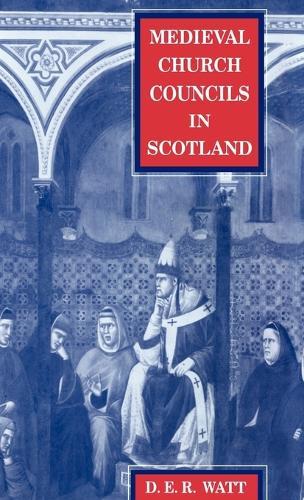Overview
Uniquely in the kingdoms of western Christendom, the Scottish bishops obtained authority, in 1225, to hold inter-diocesan meetings without a supervisory archbishop, and continued to meet in this way for nearly 250 years. Donald Watt provides an authoritative study of these church councils from the Latin and English records based on original sources.In addition to creating an original work of considerable historical interest, Professor Watt brings discussion of the councils and their significance into the broader context of Scotland's political, legal, ecclesiastical and social situation over a long period.An important contribution to Scottish church history and to its influence on contemporary affairs.
Full Product Details
Author: Donald Watt
Publisher: Bloomsbury Publishing PLC
Imprint: T.& T.Clark Ltd
Dimensions:
Width: 13.80cm
, Height: 1.50cm
, Length: 21.60cm
Weight: 0.390kg
ISBN: 9780567087317
ISBN 10: 056708731
Pages: 204
Publication Date: 01 December 2000
Audience:
General/trade
,
College/higher education
,
Professional and scholarly
,
General
,
Undergraduate
Format: Hardback
Publisher's Status: Active
Availability: Manufactured on demand

We will order this item for you from a manufactured on demand supplier.
Language: English
Reviews
This simple but important story is here worked out on the basis of a meticulous criticism of the original sources. --Theologische Literaturzeitung Redaktion
This scholarly volume presents a broadly chronological analysis of the working of Scottish provincial councils both as agents of ecclesiastical reform and as institutions firmly embedded within the political structure of the realm and subject to at least a measure of royal control. In making a contribution to a major international series, Watt has had to grapple with the notorious deficiencies of the Scottish source material and the problems of its interpretation . . . Watt is to be congratulated on presenting the first full analysis of an organ of the Scottish Church which certainly functioned more smoothly without an archbishop than it was ever able to after 1472. Ecclesiastical History 53.1 The detailed account of this institution which Donald Watt provides is, moreover, an impressively sustained piece of scholarship. The main body of evidence, the extant diocesan and provincial statutes, is bristling with interpretive challenges. The Journal of Religious History Ce livre est une contribution importante a l'etude de l'influence de l' Eglise ecossaise sur les structures socio-politiques plus larges du bas moyen age. Revue d'Histoire Ecclesiastique 96.3 This simple but important story is here worked out on the basis of a meticulous criticism of the original sources. Theologische Literaturzeitung Redaktion
Author Information
Donald E. R. Watt is Emeritus Professor of Scottish Church History at the University of St Andrews.



